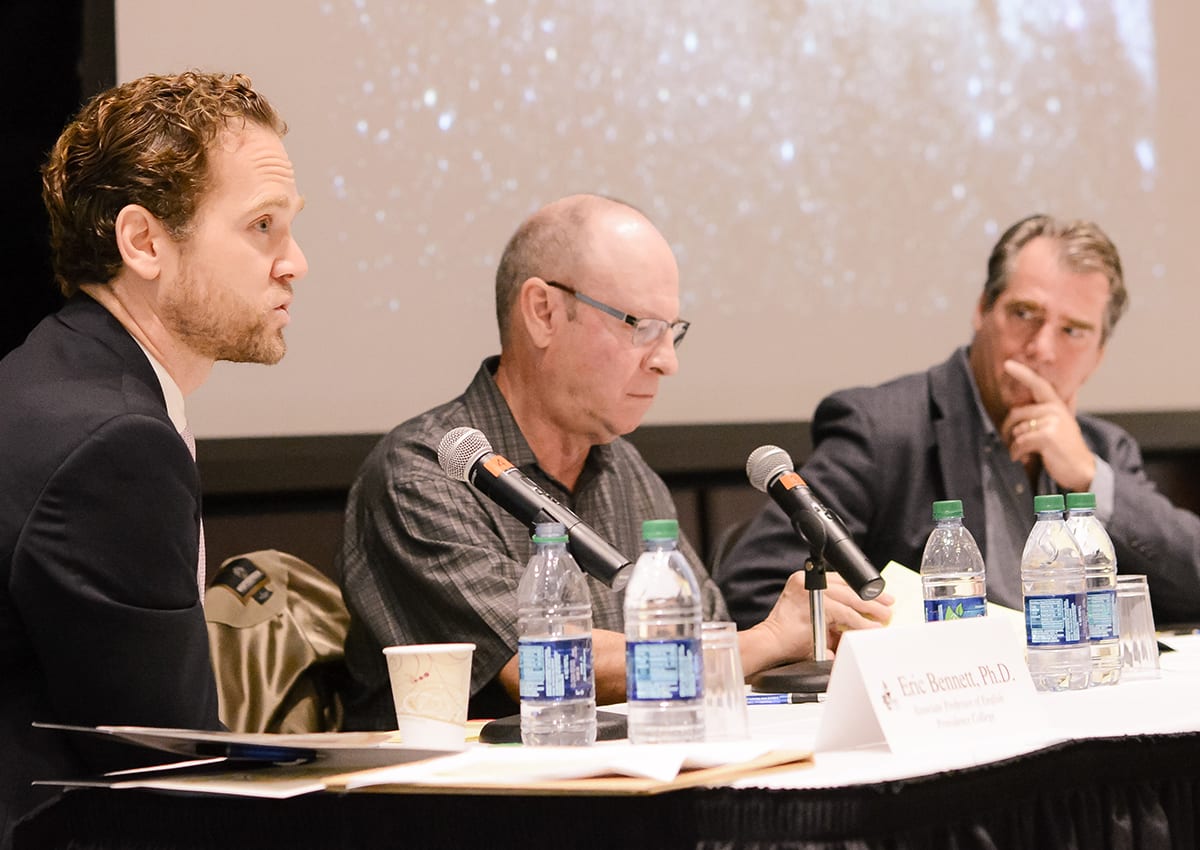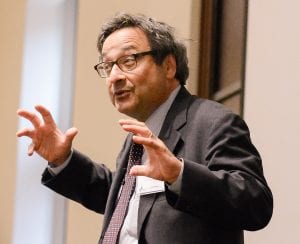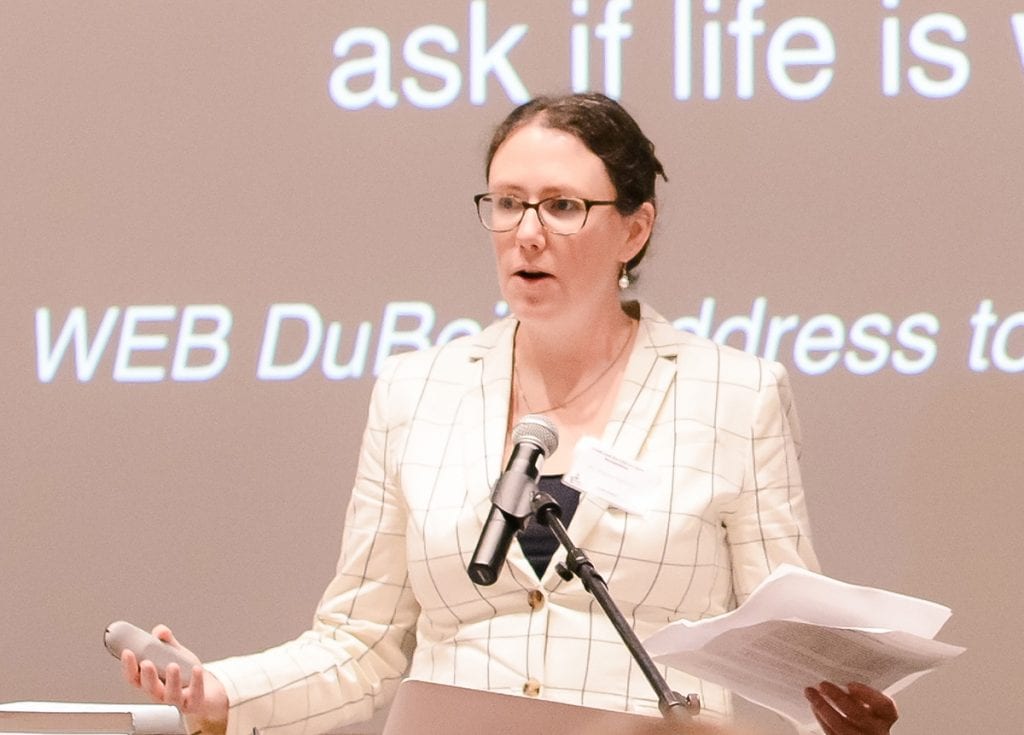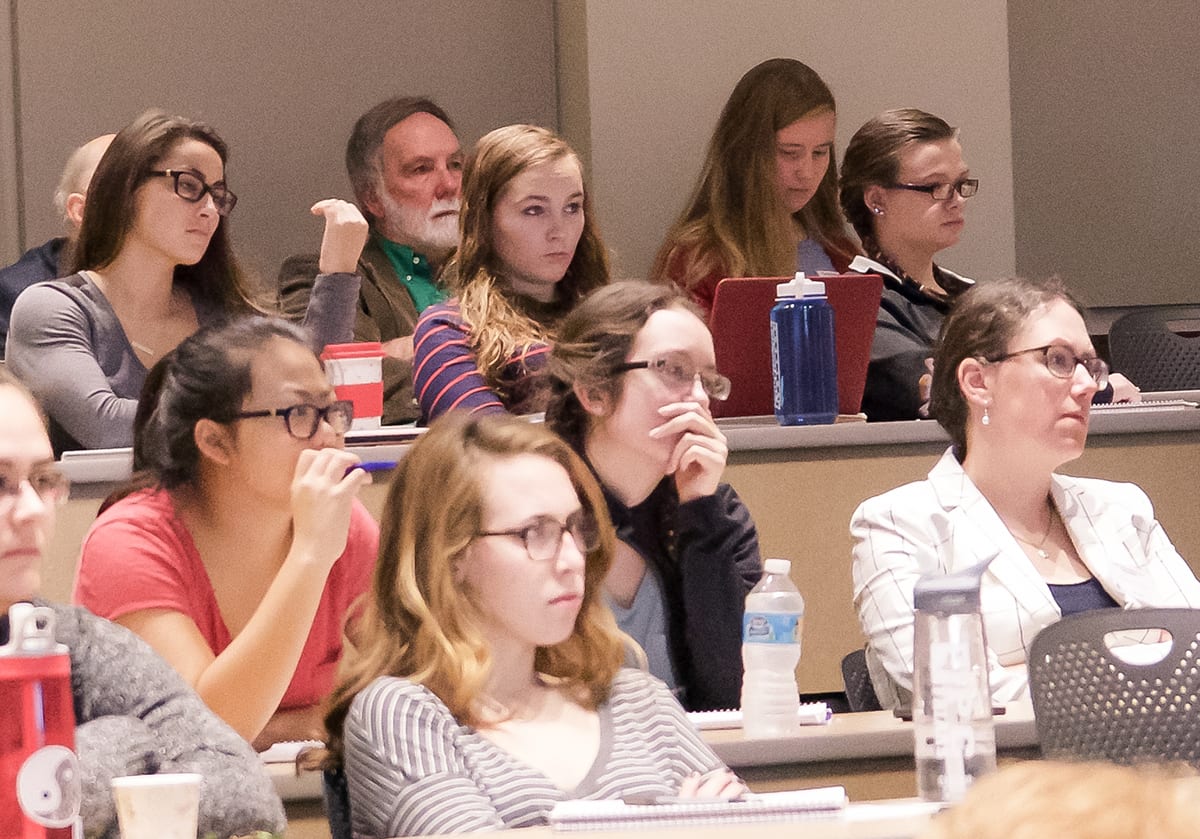November 11, 2016
First Liberal Arts Honors Program Symposium on truth features keynotes, scholars

By DEB HAZIAN
Following three years of planning, the Liberal Arts Honors Program launched its first two-day symposium, Truth and the Liberal Arts, drawing scholars to campus for presentations and discussions focusing on Providence College’s core value — truth — in a liberal arts education.
Doris Kearns Goodwin, world-renowned presidential historian and Pulitzer Prize-winning author, kicked off the events on Oct. 21 with a presentation in the Peterson Recreation Center.
On Oct. 22, two panel discussions featuring leaders in the media and academia were followed by a keynote address by Dr. Andrew Delbanco, the Alexander Hamilton Professor of American Studies at Columbia University.

The first panel, “Truth in Contemporary Media,” included Roy Peter Clark ’70, senior scholar at the Poynter Institute; Charles Sennott ’03Hon., the founder and executive director of The GroundTruth Project and a former foreign correspondent for The Boston Globe; and Dr. Eric Bennett, associate professor of English at PC. The panel was moderated by Dr. Kelly Malone ’86, professor of English at Sewanee: The University of the South.
“Truth in Philosophy, Science, and Religion,” the second panel of the day, featured Dr. Meghan Sullivan, associate professor of philosophy at the University of Notre Dame; Dr. Kenneth Miller, professor of biology at Brown University; and Rev. Nicanor Austriaco, O.P., professor of biology and theology at PC. Dr. Colin G. King, PC assistant professor of philosophy, served as moderator.
Delbanco, who was awarded a National Humanities Medal by President Barack Obama in 2011, traced the growth of American higher education from the founding of Harvard College in 1635 to the growth of land-grant colleges and research universities, and to liberal arts colleges today. In his talk, “The Liberal Arts: Past, Present and . . . Future,” he also discussed challenges facing liberal arts institutions.
Colleges, he said, provide a place and process where young people begin to sort out their lives in a way that’s true to themselves and responsible to others. “We have to try to do what we can in our own institutions to stay true to this mission,” he said. “The truth will never go out of fashion.”
Dr. Christopher Arroyo, associate professor of philosophy, praised Delbanco, saying, “Andrew Delbanco’s talk, which was witty and conversational and sophisticated, made precisely the case we need to make at PC for the liberal arts. It is the case that can acknowledge some of the injustices and imperfect embodiments of the values of our Catholic, liberal arts, and humanitarian inheritance while insisting on a respectful mode of critique that can be effective precisely because it draws on the best that our Catholic inheritance and western European canon has to offer.”
“I enjoyed the symposium a great deal,” said Kate Jorgensen’15, who is earning a master’s degree in English at Boston College. “The question of what truth is and how truth is revealed in the world is a fundamentally important issue not only to the College, but to the world at large.”

The idea for a symposium developed in 2013 when the Liberal Arts Honors Program Leadership Council, a group of dedicated alumni and faculty, formed a strategic planning subcommittee, chaired by Dr. James M. Ludes ’93. The subcommittee’s objective was to benchmark student experiences at peer and aspirational peer institutions, explained Dr. Stephen J. Lynch, professor of English and director of the Honors Program.
“We strived to create a conference on an interdisciplinary topic relevant to the Honors DWC Program and the liberal arts nature of the College,” said Lynch. “Most academic conferences focus on a single discipline and break down into sessions on very narrow topics within the discipline. We wanted to do something completely different — to offer a conference on a big question that concerns all disciplines.”
“Our hope was to raise awareness of the excellence of the Honors Program, the College’s faculty, and its remarkable curriculum,” said Ludes, who serves as executive director of the Pell Center for International Relations and Public Policy at Salve Regina University.
“A liberal arts education is important because it not only conveys information about particular fields of study, it teaches you how to live your life. It also provides the skills breadth and flexibility so important in today’s work environment, regardless of one’s chosen career,” said Michael Woody ’77 & ’83G, the chair of the Leadership Council.
Once the theme of “truth” was determined, Lynch and Dr. Suzanne J. Fournier ’77, associate professor of English and associate director of the Honors Program, sought speakers from a variety of disciplines. In addition to the speakers and panelists, Lynch and Fournier coordinated other logistics of the symposium, with advice and support from Ludes.
“To our great delight, every speaker we invited agreed to take part in the symposium,” Fournier said. “We organized two different panels in an effort to represent the liberal arts as fully as possible. Their contributions were framed nicely by the keynote addresses of Doris Kearns Goodwin and Andrew Delbanco.”

Seeing the symposium come to fruition was “invigorating,” said Woody. “We are proud of the result, and I think the Providence College community can be proud as well.”
The event was insightful for students, Lynch said. “Students spend most of their time in a class with one professor. At the symposium, they could see how professors disagree, rethink their ideas, and sometimes change their perspectives.”
Along with the Leadership Council, the College’s Centennial Committee, led by co-chairs Rev. Kenneth Sicard, O.P. ’78 & ’82G, executive vice president and treasurer, and Ann Manchester-Molak ’75, assistant to the president and executive vice president, provided critical support for the symposium. The first symposium was held this year to coincide with the College’s centennial.
According to Woody, the symposium assuredly achieved its goals. “Based on the glowing remarks from panelists and presenters, I expect they will spread the word throughout the country about the conference, Providence College, and the Liberal Arts Honors Program,” he said.
“Between the keynote speakers and the panels, I think the Honors Program underscored its role as a critical academic component in a distinctive liberal arts education,” said Ludes. Feedback has been “uniformly positive.”
“It was a remarkable event — from the opening to the closing keynote. It was a wonderful tribute to the leadership of the Honors Program on campus and the broader scholarly community,” Ludes said.
Lynch said the next symposium will take place in 2019, as the Honors Program will present its signature annual program, the fall Convocation and Distinguished Alumni Address, in 2017 and 2018.





